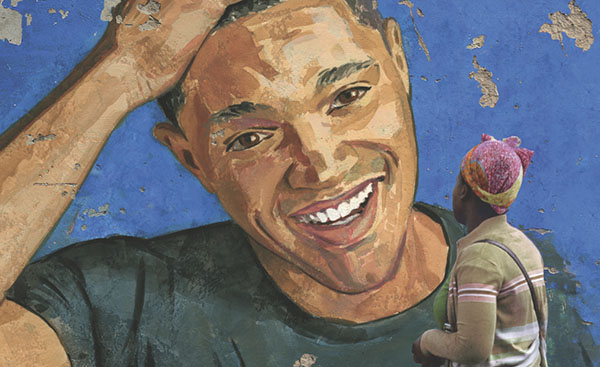Born a Crime conveys power of son’s love

NOTABLE NOAH: Gazing at a portrait of her son, Trevor Noah’s mother is displayed on the cover of Noah’s memoir titled, Born a Crime. Noah’s stories center around his childhood, as he grew up in apartheid South Africa, the son of a black woman and a white man.
March 16, 2018
On Christmas Eve, my family’s exciting holiday plans were to sit on a plane for 22 hours on our way to South Africa. Don’t get me wrong— I was beyond excited to go to South Africa, but I thought there was no way I was going to survive sitting for that long. My mom, aware of my concerns, decided to give everyone in my family a copy of Trevor Noah’s book, Born a Crime. At first, I was skeptical of reading a book I didn’t have to read, but I asked myself, “What would be better than reading a book about South Africa by a South African on the way to South Africa?”
In his funny, sad and heart-wrenching book, Noah tells stories of what it was like growing up during apartheid and adjusting to a post-apartheid world.
During apartheid, it was illegal for interracial relationships of any kind, which led to the title of the book. Noah was born to a black, African mother and a white European father, showing that he was truly “born a crime.”
Due to Noah’s dad being white and having a black son under apartheid, Noah could rarely see him. Noah writes about how “the only time [he] could be with [his] father was indoors,” as it was too dangerous for Noah to be seen with him. Despite being too dark to be seen with his dad, his skin was too light be seen with his mom. In public, he writes, “She would hold [his] hand or carry [him], but if the police showed up she would have to drop [him] and pretend [he] wasn’t hers.”
When Noah was little he would be forced to hide under his bed if anyone showed up because he would be taken away if the police saw his mixed skin living in a black African household. Noah thought his mom liked to play hide-and-go-seek; it wasn’t until he went back and wrote the book that he found out the true reason for hiding. The theme of self-discovery is apparent within the book, as Noah found deeper meanings in his stories as he wrote the book.
Born a Crime begins with the story of how his mother was shot, not to grab the reader’s attention, but to reveal the true reason for writing his book: a love story to his mom. Growing up with just himself and his mom, they lived in poverty for most of their life, but his mom never let him see it. Even when they were eating worms for dinner, Noah’s mom made sure he got an education and didn’t shelter Noah from failing so that he could learn to get up.
The most moving part of Born a Crime is that it is not a typical “celebrity writes a memoir” book. It’s so much more than that. Noah doesn’t even mention his success, as the story focuses instead on the struggles of being a mixed child during a time of racism and inequality. But while all of this was happening, Noah was just a teenager, going through the same awkward situations as any other kid. He tells the hilarious stories of him growing up, my favorite being how he became one of the top DJs in Johannesburg.
Reading this book, I went from laughing on one page to shocked the next at how a modern country could have these laws against minorities. That was the beauty of the book, something that most memoirs lack. I was able to get a better sense of an evolving culture while getting a firsthand account of what it was like to live during that time. Going to South Africa as I was reading the book made it all real. I was able to see the struggles Noah and his mother had faced within the streets of South Africa, but I was also able to see where the funny stories he shared had taken place.
The South African government couldn’t decide on one official language, so they made eleven. Noah’s mother taught him all eleven languages so he would be able to connect with everyone. “If you spoke to me in Zulu, I replied to you in Zulu,” Noah writes. “If you spoke to me in Tswana, I replied to you in Tswana. Maybe I didn’t look like you, but if I spoke like you, I was you.”
Whether going to Africa is or isn’t in your future, reading this book gives insight into a different culture. For me, reading Noah’s story made me realize how recent the apartheid was. It was an eye-opening experience and I’ll definitely be following Trevor Noah from now on.


